June marked the 25th Anniversary of Gramercy! Thank you to our valued investors, trusted business partners and team members without whom this milestone could not have been reached. We are excited for the opportunities we see ahead, and look forward to continuing to deliver upon our mission to have a positive impact on the well-being of our clients, portfolio investments (and their communities) and our team members.
Contents
Market Overview
Macro Review
Chair Powell’s Jackson Hole remarks signaled that another hike is probably likely. On Friday, the market anticipated that a September pause and final November hike was the more probable outcome. Powell’s speech supported the notion of higher for longer and that signs of more strength could warrant additional action. Secondly, it appears that restrictive policy had yet to fully slow the economy. Another theme over the week was mixed earnings where tech comfortably outperformed retailers. The parallel between Nvidia relative to Foot Locker, Macy’s and Peloton was noteworthy. Meanwhile, U.S. Treasuries staged a mild recovery having sold-off to levels not seen in fourteen years, which in turn pushed U.S. mortgage rates to the highest level since December 2000 (7.31%). Fed pricing of the U.S. terminal rate increased and unwound the idea of policy cuts in 1H24. This was triggered by a structurally higher R* in relation to U.S. inflation, even as global PMIs disappointed to the downside and weak retail sales in Canada and New Zealand caused some alarm. Earlier in the week, S&P joined Moody’s in cutting U.S. bank ratings amid higher interest rates and deposit outflows. That was largely ignored by markets as the commentary was similar to Fitch and Moody’s earlier in August. Germany also reported negative PPI, weak PMIs and a miserable IFO business survey, which helped bunds stage a rally. Weakening macro conditions in China also stood out. The PBOC cut the one-year Loan Prime Rate by 10bps to 3.45% but left the five-year unchanged at 4.20%. Elsewhere, the expansion of the BRICS Summit created headlines. The pace at which new countries were invited could raise the question of the global reserve currency once again, but that is not an immediate risk factor. Finally, Turkey raised its policy rate by 750bps to 25%, which saw the currency appreciate 6% on Thursday, CDS rally 30bps and bonds rally 2pts.
EM Credit Update
Emerging market sovereign credit (cash bonds) ended the week up 0.8% with credit spreads 9bps tighter. Sovereign outperformers were Pakistan, Tunisia and Egypt, while Zambia, Ukraine and Ethiopia underperformed. The broader theme over the week was the rally in EM duration, as U.S. Treasuries bear flattened with the 30-year bond that rallied 6bps.
The Week Ahead
The digestion of news flow out of Jackson Hole will remain the larger risk event into next week. U.S. non-farm payrolls, JOLTS and the Fed’s preferred inflation metric (core PCE deflator) are the key fixtures. In Europe, the release of ECB minutes, Euro-Area CPI and UK housing data stands out, especially as a September pause had been mooted after weak PMIs. China’s manufacturing PMI is expected to remain soft with external disruptions, which is a consistent picture in developed markets. Hong Kong is expected to produce a steady picture with regards to retail sales, while India’s GDP and Indonesia’s inflation are due. EM interest rate decisions are expected from Hungary (13%) and Kazakhstan (16.25%). Finally, other GDP releases are expected from Brazil, Mexico and Turkey.
Highlights from emerging markets discussed below: China continues to cut rates but less than expected; Turkey’s pursuit of orthodox monetary policy is viewed as helpful; Turkish financial regulatory changes; and Correa proxy and centrist political newcomer head to October runoff in Ecuador’s Presidential Elections .
Fixed Income
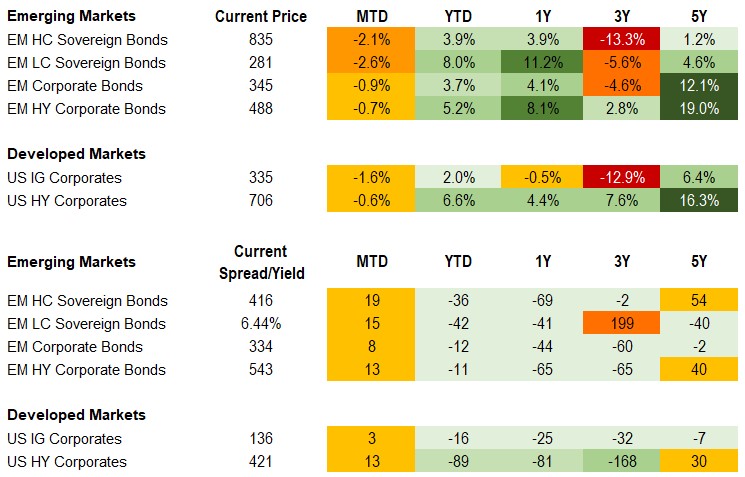
Equities
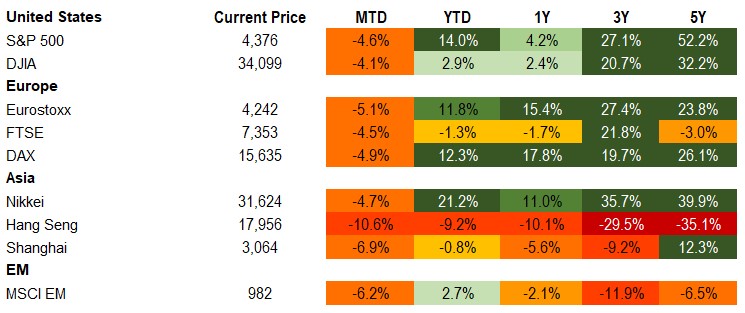
Commodities

Source for data tables: Bloomberg, JPMorgan, Gramercy. EM Fixed Income is represented by the following JPMorgan Indicies: EMBI Global, GBI-EM Global Diversified, CEMBI Broad Diversified and CEMBI Broad High Yield. DM Fixed Income is represented by the JPMorgan JULI Total Return Index and Domestic High Yield Index. Fixed Income, Equity and Commodity data is as of August 25, 2023 (mid-afternoon).
Emerging Markets Weekly Highlights
China continues to cut rates but less than expected
Event: The National Interbank Funding Center cut the one-year loan prime rate by 10bps to 3.45% but kept the five-year LPR at 4.20% following last week’s one-year MLF rate cut of 15bps and 7-day reverse repo rate cut of 10bps. The market was surprised by this, as normally the one-year and five-year rates follow each other and a 15bps cut was expected.
Gramercy commentary: The measures were broadly in line with expectations and reactive stimulus going forward is our base case. We also believe that the Chinese government will continue to support the property sector. It is probable that the smaller rate cut allows commercial banks to prepare for continued mortgage refinancing and allows for a slower decline in bank’s net interest margins, as large state-owned banks net interest margins fell to 1.67% in 2Q23 from 1.69% in 1Q23. We expect further policy easing and for the five-year LPR eventually to match the one-year LPR.
Turkey’s pursuit of orthodox monetary policy is viewed as helpful
Event: The Turkish Central Bank (CBRT) raised its one-week repo rate by 750bps to 25%. This sparked a rally in the Turkish lira and signaled intent to rein in inflation this time round. The Central Bank Committee said that it would continue on the path of monetary tightening and bring inflation down in the medium-term to its 5% target, from 47% currently.
Gramercy commentary: Governor Erkan’s first three months have shown credible signs that monetary policy is normalizing in Turkey. Inflation peaked at 85% in October 2022 and while inflation did increase to 47.8% in July from 38.2% in June, some progress has been made. In early August, the CBRT had increased its year-end inflation forecast to 58% from 38%, although this is still very distant from the medium-term target of 5%. It is likely that the Central Bank will need to do more, but this is an appropriate third step after raising the one-week repo rate by 750bps in June and 250bps in July. The Monetary Policy committee noted that applying the brakes on inflation would see disinflationary pressures kick in by 2024.
Turkish financial regulatory changes
Event: The Turkish Central Bank announced new banking sector regulations designed to begin unwinding the infamous FX-protected savings accounts (KKM) that has increased by over 50% since 1Q23 to total around $125bn – approaching one third of all bank deposits in Turkey.
Gramercy commentary: While we welcome the arrival of long awaited gradual adjustments in the direction of economic orthodoxy, in the short-term we perceived the partial reversal of FX-protected accounts as a transfer of risk from the sovereign to the banking sector. The failure to remove caps on lending rates on key sectors adds risk to the normalization process and will likely come at the expense of lower bank margins, profitability and ultimately capitalization as the asset quality strain associated with material higher rates feeds through the financial system. If sustained and managed carefully, the longer-term impact on these adjustments is positive but international investor confidence in the commitment to orthodoxy remains low given prior episodes and the forthcoming political calendar. The notable rally in Turkey sovereign and corporate bonds through August has left valuations stretched in our view and will likely incentivize increased international primary market activity from September that will test technicals.
Correa proxy and centrist political newcomer head to October runoff in Ecuador’s Presidential Elections
Event: The results in the first round of Ecuador’s Presidential Elections produced a runoff between Luisa Gonzalez, leftist Ex-President Rafael Correa’s hand-picked candidate, and centrist Daniel Noboa, son of one of Ecuador’s wealthiest businessman. Gonzalez received around 33% of the vote vs. Noboa’s 24%. In third place with around 16% was Christian Zurita, who replaced the murdered Fernando Villavicencio, a long-time anti-Correa activist. The runoff between Gonzalez and Noboa is scheduled to take place on October 15th.
Gramercy commentary: In our assessment, the first-round results signal that the Correismo candidate is no longer the favorite to win the presidency, a credit positive development. Noboa, a 35-year-old heir of one of the country’s Banana industry empires and a newcomer to politics, largely outperformed his poll numbers. This result was likely boosted by demand for non-establishment candidates and his excellent performance in the last pre-election debate. The shocking assassination on August 9th of Fernando Villavicencio, long-time anti-Correa activist and Presidential Candidate himself, also had a significant impact on election dynamics and likely helped propel Noboa to the October runoff. In it, he appears to be in a good position against Gonzalez who is likely to struggle to expand beyond the 35% or so of core Corresita vote in the country. Meanwhile, voters of third placed Christian Zurita (16%) as well as other centrist candidates are likely to support Noboa, in our view. Improved prospects of having a non-Correista President to finish outgoing Guillermo Lasso’s term until early 2025 is a constructive development for Ecuador’s market assets that have been pricing the return of populist economic policies under a potential Gonzalez Presidency, which now appears less likely. Given dislocated valuations, we see further upside for the sovereign bond complex, provided that Noboa solidifies his position as a favorite to win the presidency in October and the National Assembly composition is confirmed to be less obstructionist compared to the one under Lasso.
Emerging Markets Technicals
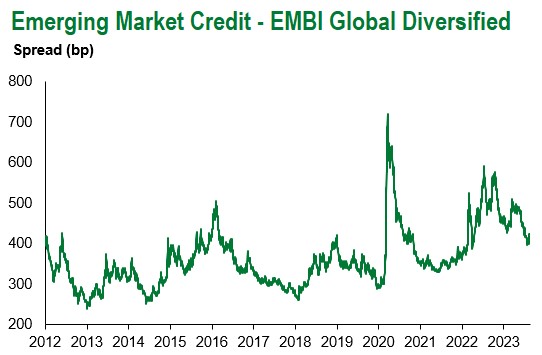
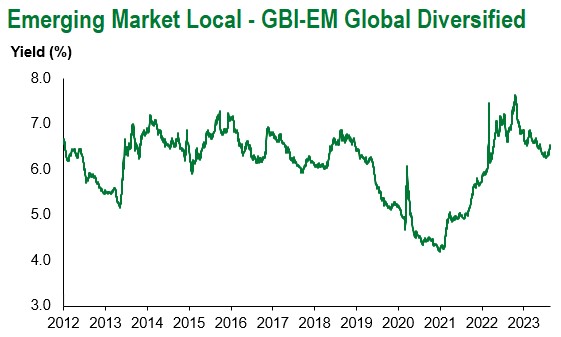
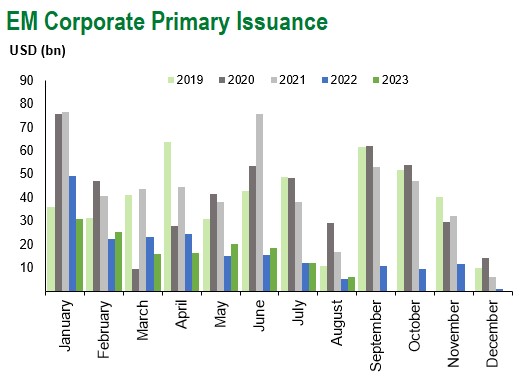
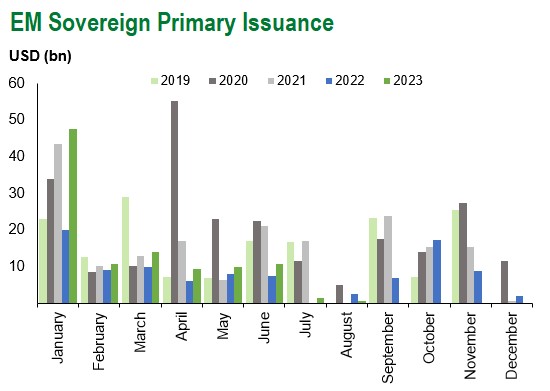
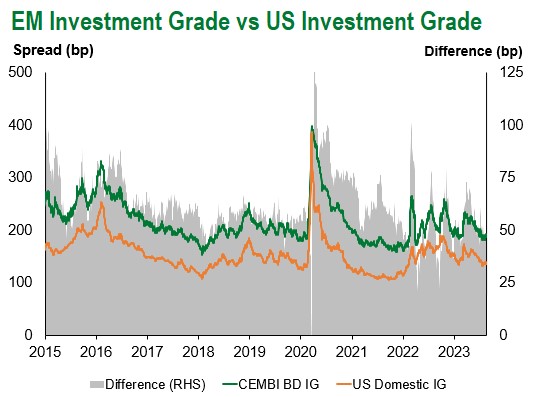
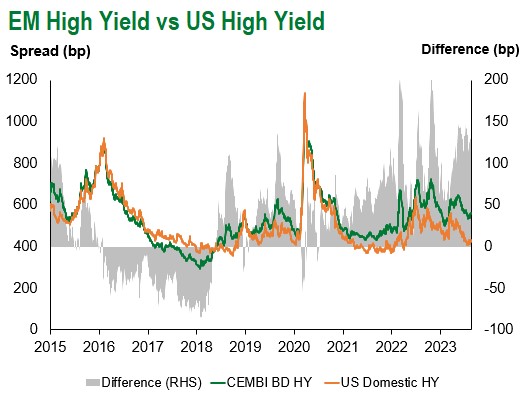
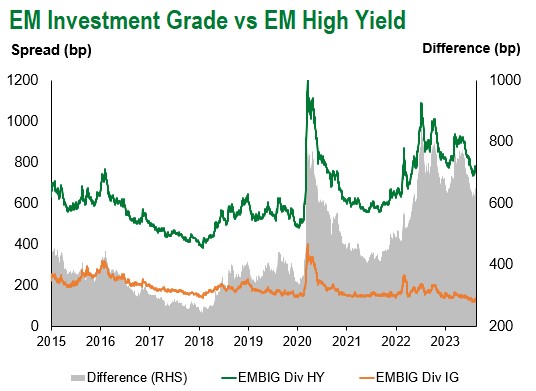
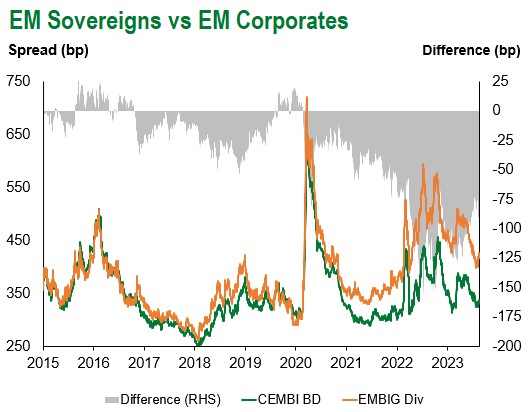
Emerging Markets Flows
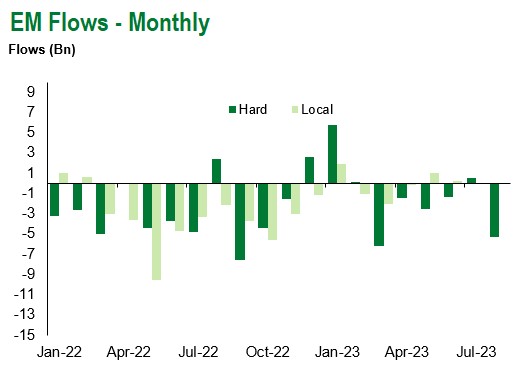
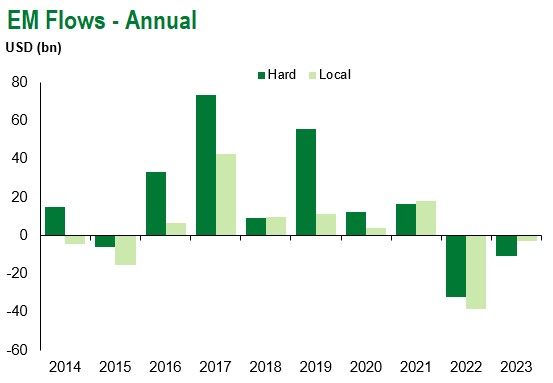
Source for graphs: Bloomberg, JPMorgan, Gramercy. As of August 25, 2023.
For questions, please contact:
Kathryn Exum, CFA ESG, Director, Co-Head of Sovereign Research, [email protected]
Petar Atanasov, Director, Co-Head of Sovereign Research, [email protected]
James Barry, Director, Deputy Portfolio Manager, [email protected]
This document is for informational purposes only. The information presented is not intended to be relied upon as a forecast, research or investment advice, and is not a recommendation, offer or solicitation to buy or sell any securities or to adopt any investment strategy. Gramercy may have current investment positions in the securities or sovereigns mentioned above. The information and opinions contained in this paper are as of the date of initial publication, derived from proprietary and nonproprietary sources deemed by Gramercy to be reliable, are not necessarily all-inclusive and are not guaranteed as to accuracy. This paper may contain “forward-looking” information that is not purely historical in nature. Such information may include, among other things, projections and forecasts. There is no guarantee that any forecasts made will come to pass. Reliance upon information in this paper is at the sole discretion of the reader. You should not rely on this presentation as the basis upon which to make an investment decision. Investment involves risk. There can be no assurance that investment objectives will be achieved. Investors must be prepared to bear the risk of a total loss of their investment. These risks are often heightened for investments in emerging/developing markets or smaller capital markets. International investing involves risks, including risks related to foreign currency, limited liquidity, less government regulation, and the possibility of substantial volatility due to adverse political, economic or other developments. References to any indices are for informational and general comparative purposes only. The performance data of various indices mentioned in this update are updated and released on a periodic basis before finalization. The performance data of various indices presented herein was current as of the date of the presentation. Please refer to data returns of the separate indices if you desire additional or updated information. Indices are unmanaged, and their performance results do not reflect the impact of fees, expenses, or taxes that may be incurred through an investment with Gramercy. Returns for indices assume dividend reinvestment. An investment cannot be made directly in an index. Accordingly, comparing results shown to those of such indices may be of limited use. The information provided herein is neither tax nor legal advice. Investors should speak to their tax professional for specific information regarding their tax situation.
